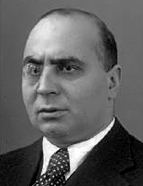

The attention he devoted to the problems of Portuguese language and culture are evident in his speeches in the national Assembly, and in his lectures in Brazilian Culture. Always faithful to the monarchy and to the ideals of the Integralismo Lusitano, with António Sardinha as his principal doctrinal point of reference, Mário de Albuquerque took advantage of the Estado Novo’s openness to monarchists, serving as a Deputy from 1938 to 1945 and 1949 to 1957. Amongst other subjects he drew attention to the situation of the National Library and the Navy Museum, at the time lacking proper facilities; he advocated the integration of the collection of the Viscount da Esperança (known as the Manizola Library) into the Faculty of Letters; he supported the reform of art teaching, by raising it to a higher level with the idea, daring at the time, of creating a Faculty of Fine Arts to equal the Faculty of Letters; he started a debate on a bill to reform the system of spelling, in line with the Luso-Brazilian accord on 1941.
However, the tension between the monarchists and the Estado Novo sharpened when he was barred from presenting his propositions to the congress of the União Nacional in 1955. As President of the Central Committee of the Causa Monárquica, he came into conflict with Marcello Caetano, his friend and former co-religionist, them Ministro da Presidência. He completed his term in parliament, but never sat as a Deputy again, making a definitive break with the regime. On 9 March 1968 he reached retirement age. On the eve of his retirement he gave his final lecture at an official session chaired by Virgína Rau, then director of the Faculty of Letters, before a vast audience of students and teaching staff. He died in his Lisbon home, on 5 January 1975, and was buried in the family tomb in Albergaria-a-Velha.
There remained from his student days his monocle, immortalized in the portrait by João Reis, and memories of brilliant talent amongst the youngsters of his time. He was colour blind. He had remarkable oratory skills. His work ranged over the whole field of university studies and not just his published work, as was the case with many of his fellow academics. In his lectures we always find the same conceptual matrix: a globalizing and problematizing history, linking the questioning of concepts and the challenging of givens with solid information and daring hypotheses.
